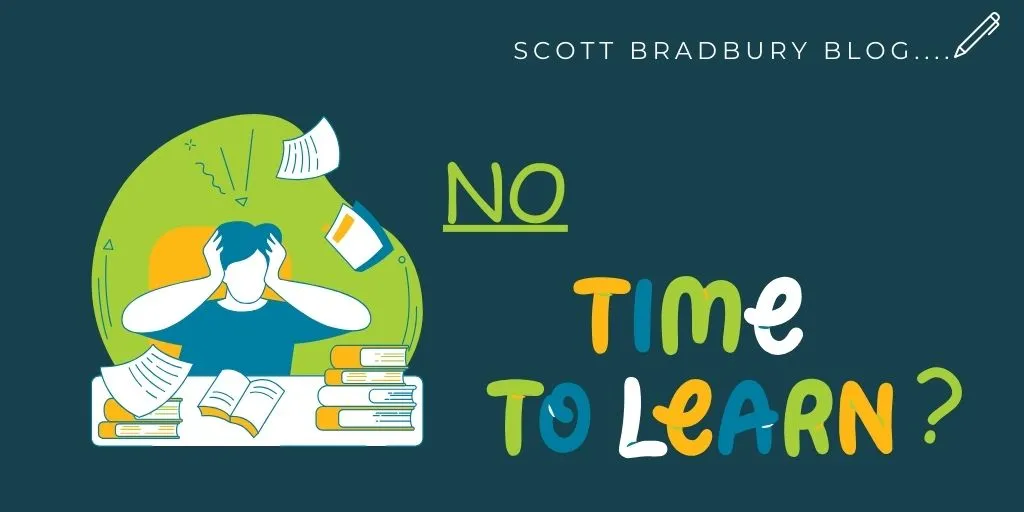
When People Don’t Have Time
Ever heard someone say they don’t have time for Christmas? Maybe in jest, or if they work in Accident and Emergency over the festive period. But generally, people make time for the things they want to do. Only this morning I found my husband emailing an American friend he wanted to ‘get back to’ when far more urgent and important tasks (note both urgent and important) were made to wait.
People are human and that means even with the most effective time management training, they tend to prioritise the tasks they enjoy or believe they will benefit from in some way. Emotional pull wins over intellectual understanding.
I’ve written about the drawbacks of a ‘busy’ mindset on other occasions - a blog in May 2017, When There Isn’t Time to Learn, and again on 24 November 2021 Busyness: The State of Having a Great Deal to Do. This isn’t a problem - or mindset - that’s going away!
In revisiting this topic again, this time I want to address the whole issue of emotional commitment and what to do when your people say they don’t have time for learning in your organisation.
Developing your skills is one of the most useful, personally advantageous activities you can undertake, so the prima facie ‘what’s in it for me?’ case is strong. Why wouldn’t you make time for something that’s so beneficial to you?
And therein lies the rub.
People don’t believe it’s going to be useful to them.
When you ask people to participate in a learning activity, whatever form that might take, and people don’t get round to it, you have to ask yourself why? And the answer is that they don’t think it works. Maybe past experiences have been disappointing. Maybe it’s not what they feel they need right now. Maybe they don’t think anyone will notice or care if they do complete the activity.
I’ve described elsewhere 15 practical tips for Marketing Your Learning and it’s essential that you sell the benefits of whatever learning activity you’re proposing. There’s a big difference between saying, ‘Use these resources to help you perform better at work’ and, ‘Use this 5-minute activity to reach out to five new contacts in other teams and boost your networking’, or ‘Watch this 5-minute video to feel confident in your next tricky performance conversations’ or, ‘Listen to this podcast to get yourself a 3-step financial wellbeing plan’.
You need to target learning experiences at specific individuals who will perceive them as timely, relevant and genuinely beneficial to them and the job they do. Give them a ‘hook’ or a reason to engage with your learning content.
I’ve been speaking recently with one Learning Professional who told me that in employee surveys they had conducted, making learning mandatory had made a real difference. I questioned this because I tend to find anything made compulsory gets the bare minimum of attention in order to get a ‘tick’ in the right completion box. Many people have told me that when it comes to compliance training, they have it running in the background whilst they get on with other tasks. So what, I asked, do you mean by ‘mandatory’ and why is it helping in your case?
The answer it seems is that by making certain learning ‘mandatory’ people feel they are being given permission to spend time on it legitimately. If someone senior says it’s OK, it’s OK. People can point to the fact that they have to do it as it’s compulsory, and therefore they feel less ‘guilty’ about taking time out to undertake a learning activity. But why the ‘guilt’? What does that tell you?
An organisation that cares about skills development and the growth of its people should have a culture where learning is valued and prioritised. It should be a workplace where people feel it’s important - and encouraged - to take a few minutes each day for a learning activity.
Expecting people to drop everything and set special time aside ‘for learning’ is a pipe dream. Instead, integrating short activities into everyday tasks, helps to improve the way these tasks are done, whilst also encouraging curiosity, critical thinking and skills development. Including an ‘inclusion moment’ conversation at the start of a meeting, for example, promotes better understanding and builds trust - which ultimately lead to stronger team performance. (We’ve a new podcast on ‘inclusion moments’ releasing early in 2024).
The next time someone tells you they ‘don’t have time for learning’ ask them about their typical day. Look for opportunities to introduce some five-minute learning breaks - but don’t call them ‘learning’; call them ‘team trust builders’ or ‘feedback phrases’ or whatever. Be specific. Be imaginative. Be relevant.
Everyone has time for learning. It’s an innate quality in all of us, from childhood. We just need our learning mojo back – and your task as a learning professional is to facilitate this. Why not start with sharing our Christmas-themed interactive Skills Challenge for December? Get your people to help the Chief Elf encourage the elf teams to embrace everyday learning, even when they say they don’t have time!
Catherine de Salvo
1 December 2023
You can contact Catherine at catherine@scottbradbury.co.uk or via LinkedIn
Useful resources
Check out our podcast Managing Your Workload (just ask me for an online demonstration)
In Time for Christmas Skills Challenge for December
Launching early 2024
Look out for:
State of Mind podcast exploring the surprising truth about what really drives performance
Inclusion Moments podcast on how to integrate valuable 5-minute conversations into everyday tasks.